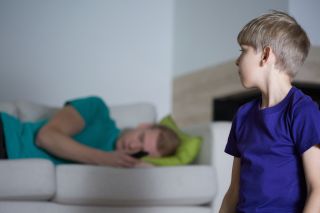
Chronic Pain
Pain in the Family
Chronic pain touches many more people than just the individual in pain
Posted April 23, 2015

There are approximately 116 million people currently suffering from chronic pain. And if you’ve read the headlines recently, you know that many people with chronic pain are also struggling with opiate dependence. When we think of treatment and intervention, many of us only consider the person in pain. However, family and friends are impacted as well. Chronic pain touches many more people than just the individual in pain. It’s difficult to see someone in pain, so it’s a natural human instinct to want to ease the suffering. But this is not always an option, and when chronic pain is coupled with opiate dependency, the issue becomes even more complex and difficult to understand.
Just as people with chronic pain require individualized, integrated treatment plans based on their specific problems, their family and friends need similar attention. The individual in a family system who has a clear and easily acknowledged issue becomes the “identified patient.” This means the family and support system rallies around the person and tries to get the help he or she needs. With a chronic pain condition, this identified patient can become the dumping ground for all of the family issues because no one else’s problems are being addressed; they are just transferred onto the identified patient. Family members’ feelings can easily go unaddressed because the focus is on the identified patient.
Families and support systems work best when everyone is operating at their best. It is very difficult to have a loved one with chronic pain. The condition can cause anger, resentment, grief, fear, anxiety and loneliness, among other emotions. These issues do not resolve themselves simply when the pain goes away. The people having these feelings also need treatment. Addressing these emotions with support groups, family therapy or individual therapy can strengthen the family and the individual as well as reduce the suffering of all involved.
No aspect of chronic pain is easy. Feelings are real and need to be addressed. Ignoring your emotions won’t make the issues disappear. At Father Martin’s Ashley, we offer family programs that address all members of the family, not just the person suffering with chronic pain or addiction.
Our co-founder, Mae Abraham said it best, “Whole families get sick. Whole families need therapy.” If you have a loved one suffering from chronic pain or addiction, you are suffering too. Know that there is treatment available and there is always hope.

